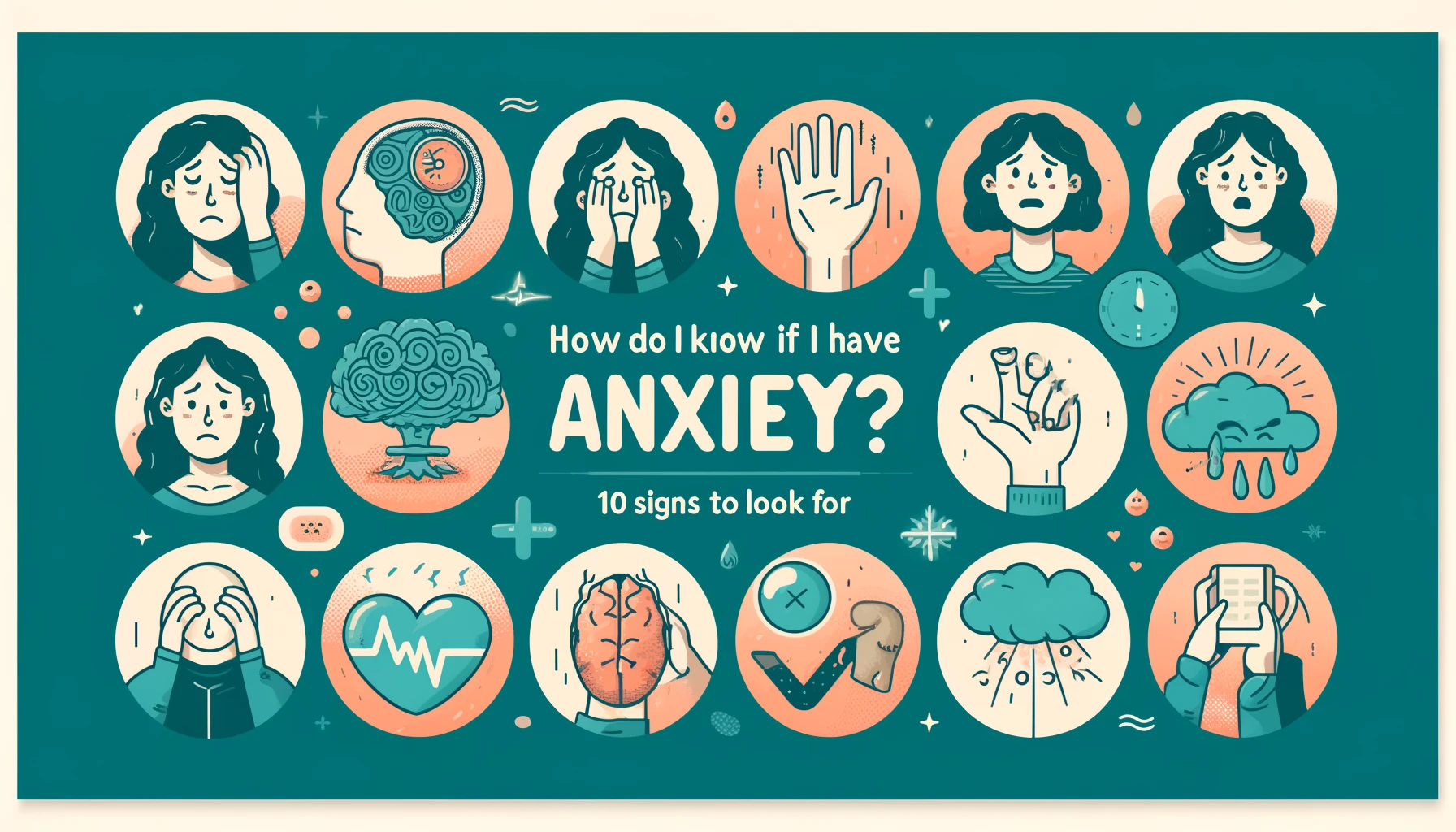
How Do I Know If I Have Anxiety? 10 Signs to Look For
Here are ten signs you may be suffering from anxiety
10 Signs of Anxiety:
1.
Excessive Worry: If you find yourself constantly
worrying about everyday events or situations, to the point where it interferes
with your daily life, it could be a sign of anxiety.
2.
Physical Symptoms: Anxiety often manifests
physically, with symptoms such as rapid heartbeat, sweating, trembling, or
feeling dizzy or lightheaded.
3.
Difficulty Concentrating: Anxiety can make it
challenging to concentrate or focus on tasks, leading to decreased productivity
and increased frustration.
4.
Restlessness: Feeling constantly on edge or
unable to relax, even in situations where relaxation is appropriate, may
indicate underlying anxiety.
5.
Sleep Disturbances: Difficulty falling asleep,
staying asleep, or experiencing restless, interrupted sleep can be a sign of
anxiety.
6.
Irritability: Anxiety can cause irritability or
a short temper, leading to conflicts in personal or professional relationships.
7.
Avoidance Behavior: Avoiding certain situations
or activities that trigger anxiety is a common coping mechanism, but it can
also perpetuate feelings of fear and anxiety.
8.
Panic Attacks: Sudden, intense episodes of fear
or panic, accompanied by physical symptoms such as chest pain, shortness of
breath, or a sense of impending doom, may indicate a panic disorder, which is
closely linked to anxiety.
9.
Muscle Tension: Anxiety often leads to muscle
tension, particularly in the neck, shoulders, and jaw, which can contribute to
headaches or body aches.
10. Excessive
Self-Criticism: Constantly criticizing or doubting oneself, along with feelings
of inadequacy or fear of failure, can be signs of underlying anxiety.
So, if you feel you are suffering from one or more of these
signs, here are some ways to help combat them
Ten Helpful Tips to Improve Anxiety:
1.
Practice Deep Breathing: Deep breathing
exercises can help activate the body's relaxation response, reducing feelings
of anxiety and promoting a sense of calm.
Find a Quiet Space: Choose a quiet and comfortable space
where you can sit or lie down without distractions.
Sit Comfortably: Sit or lie down in a comfortable
position, with your back straight and your feet flat on the floor if you're
sitting.
Close Your Eyes: Close your eyes to help shut out
external distractions and focus inward.
Take Slow, Deep Breaths: Inhale slowly and deeply through
your nose, allowing your abdomen to expand as you breathe in.
Focus on Your Breath: Pay attention to the sensation of
the breath entering your body, feeling it fill your lungs and expand your
chest.
Exhale Slowly: Exhale slowly and completely through your
mouth, releasing any tension or stress with each breath out.
Count Your Breath: To help maintain a steady rhythm, you
can count your breaths, inhaling for a count of four, holding for a count of
four, and exhaling for a count of four.
Use Visualizations: Incorporate visualizations into your
deep breathing practice, such as imagining a calming scene or picturing the
tension leaving your body with each exhale.
Practice Regularly: Make deep breathing a regular part of
your daily routine, setting aside time each day to practice, even if it's just
for a few minutes.
Combine with Mindfulness: Combine deep breathing with
mindfulness techniques, such as body scans or focused attention on the present
moment, to enhance its calming effects.
Remember that deep breathing is a simple yet powerful tool
for managing anxiety, and it's something you can do anytime, anywhere. With
practice, you can develop greater mastery over your breath and experience
increased relaxation and peace of mind.
Engage in Regular Exercise: Physical activity
releases endorphins, which are natural mood lifters that can help alleviate
anxiety symptoms.
Engaging in regular exercise is a powerful way to reduce
anxiety and improve overall mental well-being. Here are some ways to
incorporate regular exercise into your routine to manage anxiety effectively:
Choose Activities You Enjoy: Find physical activities
that you genuinely enjoy, whether it's going for a walk in nature, swimming,
dancing, or practicing yoga. When you enjoy the activity, you're more likely to
stick with it and reap the mental health benefits.
Start Slowly: If you're new to exercise or have been
inactive for a while, start slowly and gradually increase the intensity and
duration of your workouts. Begin with shorter sessions and low-impact
activities, then build up to more challenging workouts over time.
Set Realistic Goals: Set achievable exercise goals that
align with your current fitness level and schedule. Whether it's aiming for a
certain number of steps per day, completing a weekly workout routine, or
participating in a fitness class, setting goals can help you stay motivated and
focused.
Mix It Up: Keep your exercise routine interesting by
incorporating a variety of activities and workouts. Try different types of
exercise, such as cardio, strength training, flexibility exercises, and
mindfulness-based practices like tai chi or qigong.
Schedule Exercise Regularly: Treat exercise like any
other important appointment by scheduling it into your daily or weekly routine.
Consistency is key, so aim to exercise at least three to five times per week
for optimal mental health benefits.
Find an Exercise Buddy: Exercise with a friend, family
member, or workout buddy to increase accountability and motivation. Having
someone to exercise with can make workouts more enjoyable and provide social
support, which is essential for managing anxiety.
Embrace Outdoor Activities: Take advantage of the mental
health benefits of being outdoors by engaging in outdoor activities such as
hiking, cycling, or jogging. Spending time in nature can reduce stress, improve
mood, and promote feelings of relaxation and well-being.
Listen to Your Body: Pay attention to how your body feels
during and after exercise, and adjust your routine accordingly. If you're
feeling fatigued or experiencing discomfort, take a break or modify your
workout to avoid overexertion and prevent injury.
Practice Mindful Movement: Approach exercise as an
opportunity to practice mindfulness by focusing on the sensations of movement,
breathing, and muscle engagement. Mindful movement can help calm the mind,
reduce anxiety, and enhance the mind-body connection.
Celebrate Your Progress: Acknowledge and celebrate your
progress, no matter how small. Whether it's reaching a fitness milestone,
mastering a new exercise technique, or simply feeling more energized and
confident, take pride in your accomplishments and use them as motivation to
continue moving forward on your journey to better mental health.
By incorporating regular exercise into your routine and
finding activities that you enjoy, you can effectively manage anxiety, improve
mood, and enhance overall quality of life. Remember that exercise is not only
beneficial for your physical health but also plays a crucial role in supporting
your mental well-being.
Prioritize Self-Care: Make time for activities that
bring you joy and relaxation, whether it's reading a book, taking a bath, or
spending time outdoors.
Prioritizing self-care is essential for managing anxiety
and maintaining overall well-being. Here are some ways to expand upon
prioritizing self-care:
Identify Your Needs: Take the time to identify your
physical, emotional, and mental needs. Reflect on what activities, practices,
and experiences make you feel nurtured, fulfilled, and balanced
Create a Self-Care Routine: Develop a personalized
self-care routine that incorporates activities and practices that resonate with
you. This routine can include activities such as meditation, journaling, taking
a relaxing bath, engaging in hobbies, or spending time in nature.
Set Boundaries: Establish boundaries to protect your
time, energy, and emotional well-being. Learn to say no to commitments or
activities that drain you or cause unnecessary stress, and prioritize
activities that replenish and nourish you instead.
Practice Self-Compassion: Be kind and compassionate
towards yourself, especially during times of stress or difficulty. Treat
yourself with the same kindness and understanding that you would offer to a
friend facing similar challenges.
Nourish Your Body: Pay attention to your nutritional
needs and prioritize nourishing your body with healthy, balanced meals. Eating
a nutritious diet can support your physical health, regulate mood, and improve
overall well-being.
Get Adequate Sleep: Prioritize getting enough restful
sleep each night to support your physical and mental health. Create a relaxing
bedtime routine, establish a consistent sleep schedule, and create a
comfortable sleep environment to promote quality sleep.
Engage in Physical Activity: Incorporate regular physical
activity into your routine to reduce stress, boost mood, and increase energy
levels. Find activities that you enjoy, whether it's going for a walk,
practicing yoga, or participating in a group fitness class.
Practice Mindfulness: Cultivate mindfulness through
practices such as meditation, deep breathing, or body scan exercises.
Mindfulness can help you stay grounded in the present moment, reduce anxiety,
and cultivate a sense of peace and calm.
Connect with Others: Prioritize nurturing meaningful
relationships with friends, family members, or support networks. Social
connection is essential for emotional well-being and can provide support,
encouragement, and companionship during challenging times.
Engage in Activities You Enjoy: Make time for activities
that bring you joy, fulfillment, and relaxation. Whether it's reading a book,
listening to music, gardening, or engaging in creative pursuits, prioritize
activities that nourish your soul and bring you happiness.
Remember that self-care is not selfish; it's essential
for maintaining your overall health and well-being. By prioritizing self-care
and incorporating it into your daily routine, you can better manage anxiety,
reduce stress, and cultivate a greater sense of balance and resilience in your
life.
Limit Caffeine and Alcohol: Both caffeine and alcohol
can exacerbate anxiety symptoms, so it's best to consume them in moderation or
avoid them altogether.
Practice Mindfulness and Meditation: Mindfulness
techniques can help you stay present in the moment and reduce the impact of
anxious thoughts and worries.
Seek Professional Help: If you're struggling to
manage your anxiety on your own, don't hesitate to reach out to a mental health
professional for support and guidance.
Establish a Healthy Sleep Routine: Prioritize getting
enough sleep each night by creating a relaxing bedtime routine and avoiding
screens before bed.
Challenge Negative Thoughts: Learn to identify and
challenge negative thought patterns that contribute to anxiety, replacing them
with more realistic and positive perspectives.
Set Realistic Goals: Break larger tasks or goals into
smaller, manageable steps to avoid feeling overwhelmed and reduce anxiety.
Connect with Supportive People: Surround yourself
with friends, family, or support groups who understand and validate your
feelings, providing a sense of comfort and belonging.
Conclusion:
Recognizing the signs of anxiety is the first step towards
managing and improving your mental health. By understanding the symptoms and
implementing healthy coping strategies, you can take control of your anxiety
and lead a more fulfilling life. Remember, you're not alone, and there is help
and support available to you. Don't hesitate to reach out for assistance if you
need it. Take care of yourself, and be kind to yourself as you navigate your
journey towards greater well-being.
